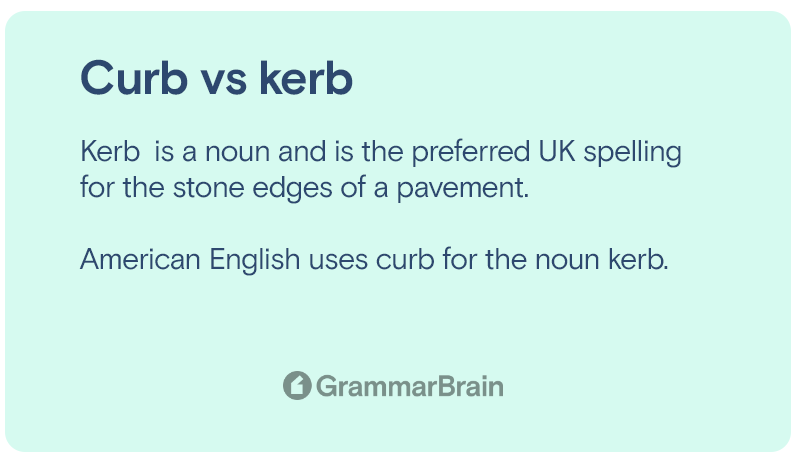Do you stop by a kerb or a curb? Do your try to curb your instincts or kerb them? Both kerb and curb sound the same, but their meanings differ. Kerb means the raised portion of pavement on the road and it separates the road from the pavement used for walking. As a verb, Curb means to restrain, control, or hold back.
We will discuss the difference between these two words, their correct meanings, and how to use them correctly.
Differences between Curb and Kerb
Curb and kerb are words that sound similar but their meanings differ. Such words are called homophones.
A homophone is a word that sounds the same as another word but means something totally different. [1] Often, there is a lot of confusion over the use of homophones.
The first use of curb was in the 15th Century as a noun for a trap passing under the jaw of a horse for controlling or retraining it. [2]
Later, in the 1700s curb was used as a noun to refer to margins of roads, sidewalks, or gardens made up of stones.
The preferred UK spelling for this is kerb, pronounced the same as curb.
Kerb can be considered the newer spelling of curb; although it is by itself centuries old. The first usage of curb as a noun, beginning with ‘C’ is from the 1400s and is derived from the French word courbe, for ‘curved’. 4
It was only in the 1800s that the spelling beginning with ‘K’ was linked with the meaning of an ‘an edging of stone (etc.) along a raised path’. [5]
Curb is also used as a verb, which means to control, rein, check, or restrict.
| Word | Definition |
| Curb (verb) | restrain or keep in check. |
| Kerb (noun) | a check or restraint on something. |
The Meaning and Usage of Kerb
Kerb is a noun and is the preferred UK spelling for the stone edges of a pavement.
Some examples:
I tripped over the kerb and hurt my knee.
The car crossed over the kerb and ran into a tree.
Kerb also refers to the place a business is conducted on the side of a street. [3]
Kerb cannot be used as a verb.

The Meaning and Usage of Curb
Curb can be used both as a verb and a noun.
- As a verb:
You need to curb your anger.
The army was called in to curb the rioters.
- As a noun:
Curbs on the use of plastic bags are needed to save the environment.
I put curbs on my daughter’s spending.
Kerb cannot be used in place of curb as a verb.
When to Use Curb in Place of Kerb
Kerb is the British English spelling for the noun form of curb.
Example:
I like to sit on the kerb and watch the traffic go by.
In American English, it can be written as:
I like to sit on the curb and watch the traffic go by.
This is acceptable.
American English uses curb for the noun kerb.
I waited on the curb for the traffic lights to change to green.
However, the words cannot be interchanged when used as a verb in American English.
For example:
Most vaccines will curb the risk of infection.
This is the correct usage.
However:
Most antibiotics will kerb the risk of infection is wrong.
Curb and kerb cannot be interchanged when used as a verb.
- You must curb your temper.
This sentence is correct in both British and American English.
- You must kerb your temper.
This is wrong in both.
Another example:
- I hurt my toe when I slipped on the kerb.
This is correct in British English and is wrong in American English, as the
word Kerb does not exist in that language.
- I hurt my toe when I slipped on the curb.
This is correct in American English but not in British English, where kerb is used.
Points to Remember
- Curb can be used both as a noun and a verb.
- Curb is the American spelling of the noun kerb.
- Kerb cannot be is not used in place of curb as a verb.
- There is no difference in pronunciation.
Conclusion
In American English, curb is used as a verb, meaning a restriction or control, or as a noun for the raised edge of a road or street.
In British English, there is a distinction between “curb” and “kerb”.
So, when writing for an audience that uses British English, you have to be careful of the correct usage.
Inside this article
Fact checked:
Content is rigorously reviewed by a team of qualified and experienced fact checkers. Fact checkers review articles for factual accuracy, relevance, and timeliness. Learn more.
Core lessons
Glossary
- Abstract Noun
- Accusative Case
- Anecdote
- Antonym
- Active Sentence
- Adverb
- Adjective
- Allegory
- Alliteration
- Adjective Clause
- Adjective Phrase
- Ampersand
- Anastrophe
- Adverbial Clause
- Appositive Phrase
- Clause
- Compound Adjective
- Complex Sentence
- Compound Words
- Compound Predicate
- Common Noun
- Comparative Adjective
- Comparative and Superlative
- Compound Noun
- Compound Subject
- Compound Sentence
- Copular Verb
- Collective Noun
- Colloquialism
- Conciseness
- Consonance
- Conditional
- Concrete Noun
- Conjunction
- Conjugation
- Conditional Sentence
- Comma Splice
- Correlative Conjunction
- Coordinating Conjunction
- Coordinate Adjective
- Cumulative Adjective
- Dative Case
- Determiner
- Declarative Sentence
- Declarative Statement
- Direct Object Pronoun
- Direct Object
- Diction
- Diphthong
- Dangling Modifier
- Demonstrative Pronoun
- Demonstrative Adjective
- Direct Characterization
- Definite Article
- Doublespeak
- False Dilemma Fallacy
- Future Perfect Progressive
- Future Simple
- Future Perfect Continuous
- Future Perfect
- First Conditional
- Irregular Adjective
- Irregular Verb
- Imperative Sentence
- Indefinite Article
- Intransitive Verb
- Introductory Phrase
- Indefinite Pronoun
- Indirect Characterization
- Interrogative Sentence
- Intensive Pronoun
- Inanimate Object
- Indefinite Tense
- Infinitive Phrase
- Interjection
- Intensifier
- Infinitive
- Indicative Mood
- Participle
- Parallelism
- Prepositional Phrase
- Past Simple Tense
- Past Continuous Tense
- Past Perfect Tense
- Past Progressive Tense
- Present Simple Tense
- Present Perfect Tense
- Personal Pronoun
- Personification
- Persuasive Writing
- Parallel Structure
- Phrasal Verb
- Predicate Adjective
- Predicate Nominative
- Phonetic Language
- Plural Noun
- Punctuation
- Punctuation Marks
- Preposition
- Preposition of Place
- Parts of Speech
- Possessive Adjective
- Possessive Determiner
- Possessive Case
- Possessive Noun
- Proper Adjective
- Proper Noun
- Present Participle
- Prefix
- Predicate



